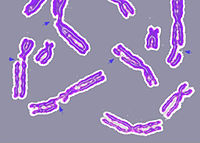
Photo from wikipedia
Secondary infections cause sepsis that lead to patient disability or death. Contact of macrophages with bacterial components (such as lipopolysaccharide—LPS) activates the intracellular signaling pathway downstream of Toll-like receptors (TLR),… Click to show full abstract
Secondary infections cause sepsis that lead to patient disability or death. Contact of macrophages with bacterial components (such as lipopolysaccharide—LPS) activates the intracellular signaling pathway downstream of Toll-like receptors (TLR), which initiate an immune proinflammatory response. However, the expression of nuclear factor-kappa B (NF-κB)-dependent proinflammatory cytokines significantly decreases after single high or multiple LPS stimulations. Knowing that poly(ADP-ribose) polymerase-1 (PARP1) serves as a cofactor of NF-κB, we aimed to verify a hypothesis of the possible contribution of PARP1 to the development of LPS-induced tolerance in human macrophages. Using TNF-α mRNA expression as a readout, we demonstrate that PARP1 interaction with the TNF-α promoter, controls macrophage immunoparalysis. We confirm that PARP1 is extruded from the gene promoter, whereas cell pretreatment with Olaparib maintains macrophage responsiveness to another LPS treatment. Furthermore, cell pretreatment with proteasome inhibitor MG132 completely abrogates the effect of Olaparib, suggesting that PARP1 acts with NF-κB in the same regulatory pathway, which controls pro-inflammatory cytokine transcription. Mechanistically, PARP1 trapping allows for the re-rebinding of p65 to the TNF-α promoter in LPS-stimulated cells. In conclusion, PARP traps prevent PARP1 extrusion from the TNF-α promoter upon macrophage stimulation, thereby maintaining chromatin responsiveness of TLR activation, allowing for the re-binding of p65 and TNF-α transcription.
Journal Title: Pharmaceuticals
Year Published: 2021
Link to full text (if available)
Share on Social Media: Sign Up to like & get
recommendations!